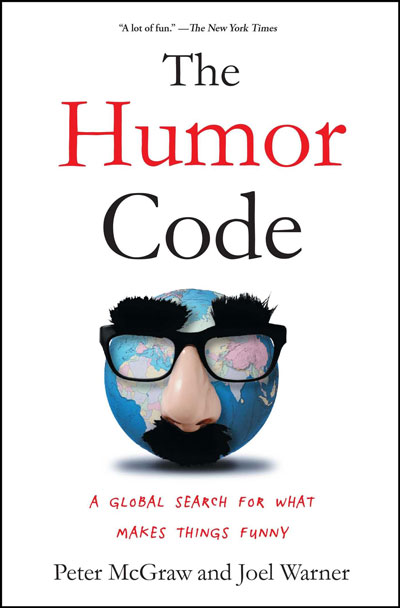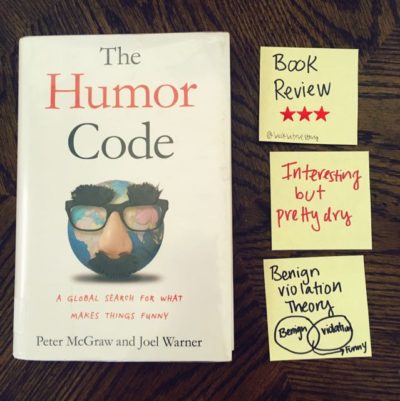
The Humor Code: A Global Search for What Makes Things Funny
by Peter McGraw, Joel Warner
Published: April 1st 2014
Genres: Non-fiction
Format: eBook (239 pages)
Source: Purchased
morePart road-trip comedy and part social science experiment, a scientist and a journalist detail their epic quest to discover the secret behind what makes things funny.
Two guys. 19 experiments. Five continents. 91,000 miles. And a book that will forever change the way you think about humor.
Part r...
The theory behind The Humor Code is that benign “moral violations” are funny. The example that he gave that set the author off on his research was about a church giving away a hummer which made the class he was teaching laugh. The example was supposed to cause disgust so one student asked why they were laughing instead. He didn’t know and now we have this book where you can fall asleep — I mean find out. Because as interesting as the ideas and travel stories are, I’ve never read such a dry and boring book about humor.
Right from the introduction, the author mentions books that came before him to explore humor. One that he mentions is called “Leviathan or Matter, Forme, and Power of a Common-Wealth Ecclesiasticall and Civil” that was published in 1651. We must have very different definitions on what humor is because that book sounds dull. Later in the book he even says that “Nobody liked [Peter Sellers] anywhere (pg 98).” Aw sad :( I liked Peter Sellers. Even though I didn’t find this book funny at all, there are some things I liked about The Humor Code.
After getting tired of reading so much about humor but not laughing, I would get on YouTube after reading a chapter and try to apply his theory of benign violation to stand-up comedians. It’s definitely a new way to see humor that I hadn’t thought about before. The definition of the benign violation theory is “when something seems wrong, unsettling or threatening (i.e., a violation), but simultaneously seems okay, acceptable, or safe (i.e., benign). (pg 9)” He gives two strategies for applying this kind of humor. The first one is the Sarah Silverman strategy which makes shocking things like AIDS seem more harmless. The second on is the Seinfeld strategy which points out what is wrong with everyday things that we’ve accepted as harmless. Sometimes I could see this strategy in the YouTube videos I watched and sometimes I couldn’t. Either way, I enjoyed being a little more analytical of why things are funny.
Writing humor is odd. Comedians work really hard to get a subconscious response from people. The author describes writing humor as “if the point of the Sistine Chapel ceiling were to get the Pope to sneeze. (pg 42)” Not an example I would have used, but ok. Point taken.
Here are some vague and random tips on how to be funny:
- Fuse two frames of reference that have nothing to do with each other
- Be clever so you can have lots of frames of reference to work with
I found the chapters on the dark side of humor and the ability of humor to undermine power structures really interesting. I was disappointed in the chapter about Japanese humor which explained absolutely nothing about it other than it’s the kind of humor you have to be there to get. The author really didn’t need an entire long and tedious chapter to tell us that. I also didn’t see the point of the extremely awkward and short interview with Louis CK. And the chapter about finding the laughing disease in Africa that they never actually found made my entire book club mad. The consensus from my book club was that it would have made a great TED talk or podcast episode but it was pretty boring as a book.
If you do decide to read The Humor Code, here are some of the YouTube videos I watched when I took a humor break. (Direct links below in case embedded ones don’t work)
Every Couple Has a Hyper One, and a Chilled One…
James Veitch Is A Terrible Roommate – CONAN on TBS
Taylor Tomlinson On Growing Up Religious & Abstinent – CONAN on TBS
https://www.youtube.com/watch?v=f5d8pVg3Qtg
Book Review of The Humor Code on a Post-it
I post reviews like this on Instagram. Be sure to follow me there!











 My name is Jessica. I love to read Young Adult and classic literature. I’ve been a book blogger for six years and I haven’t gotten tired of it yet. I’m a very curious reader. Writing about all the questions and thoughts I had while reading a book is the best hobby ever.
My name is Jessica. I love to read Young Adult and classic literature. I’ve been a book blogger for six years and I haven’t gotten tired of it yet. I’m a very curious reader. Writing about all the questions and thoughts I had while reading a book is the best hobby ever.
I guess this one sounds interesting but I’d expect a book about humor to be funny.
I’m with Jenny. I’d expect a book about humor to be funny. It sounds like they missed the mark, lol.
I’m sorry to hear you found this such a dry read! While it didn’t make me laugh out loud, I thought the authors did a really good job making their material entertaining.
I love that you actually checked out some comedians and tried applying their theory. I don’t watch a ton of stand-up comedy and it honestly didn’t occur to me to check some out and see how their theory held up.
I liked their analytical approach to the topic too :)